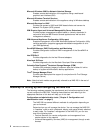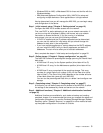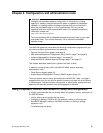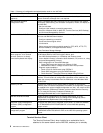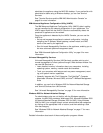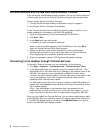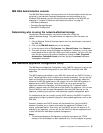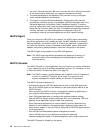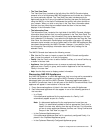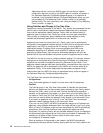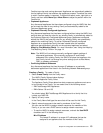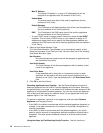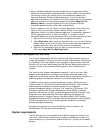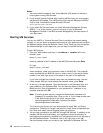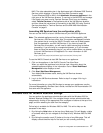the built-in Ethernet controller. Be sure to connect the built-in Ethernet connector
to the same physical network as your systems management console.
2. The Advanced Appliance Configuration Utility must be running to configure
newly installed appliances automatically.
3. The system running the Advanced Appliance Configuration Utility console
automatically maintains a copy of its database (ServerConfiguration.dat) in the
Advanced Appliance Configuration Station installation directory. To remove
previous configuration data, close the Advanced Appliance Configuration Utility,
delete this file, and then restart the utility. This deletes all previously configured
Families. However, the Advanced Appliance Configuration Utility will
automatically discover connected appliances and their network settings.
IAACU Agent
Once you connect the NAS 200 to your network, the IAACU agent automatically
reports the appliance’s serial number and type, the MAC address of its onboard
Ethernet controller, and whether DHCP is in use by the appliance. Furthermore, it
will report the hostname, primary IP address, subnet mask, primary DNS server
address, and primary gateway address if these are configured on the system.
The IAACU agent is preinstalled on your NAS 200 appliance.
Note: The IAACU agent periodically broadcasts the appliance IP settings. To
prevent the service from broadcasting this data periodically, stop the
iaaconfig service.
IAACU Console
The IAACU Console is a Java application that you install on one remote workstation
in your network for use as a systems-management console. For information on how
to install the IAACU Console, see Table 13 on page 79.
Note: The IAACU creates a private database that is specific to the IP subnetwork
to which it is attached. Therefore, do not install it on more than one
systems-management console residing on the same IP subnetwork.
The IAACU Console enables you to:
v Automatically discover NAS 200 appliances, as well as other IBM appliances,
that run the IAACU agent and are attached to the same physical subnet as the
IAACU Console.
When you start the IAACU Console, it automatically detects all appliances on
your physical subnet that are running the IAACU agent.
v Use a GUI-based application to configure the appliance network settings.
Use the IAACU to assign network parameters such as IP addresses, DNS and
gateway server addresses, subnet masks, and hostnames.
v Group discovered appliances into function-specific Families. Appliances are
added to a Family based on the appliance type. Appliances that perform the
same function appear in the same Family. (Note that all NAS 200 appliances are
in the same family.)
v Start UM Services Web-based systems-management console.
Launch UM Services on your appliances and perform advanced
systems-management tasks on a selected appliance with a single mouse click.
The IAACU Console is divided into two panes:
10 NAS 200 User’s Reference



